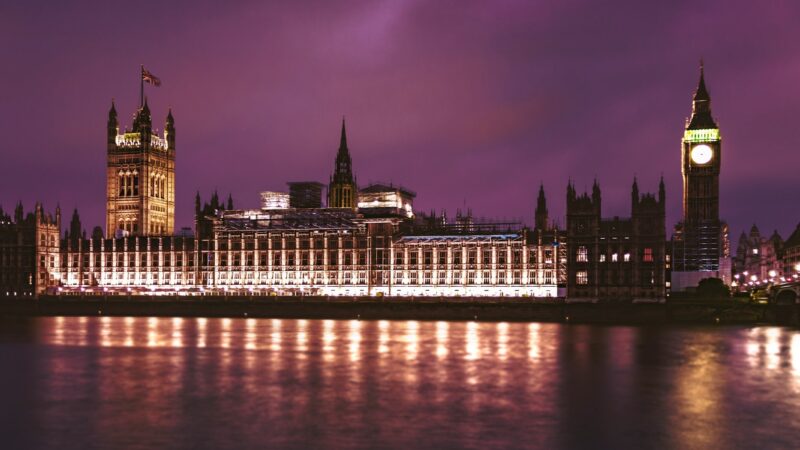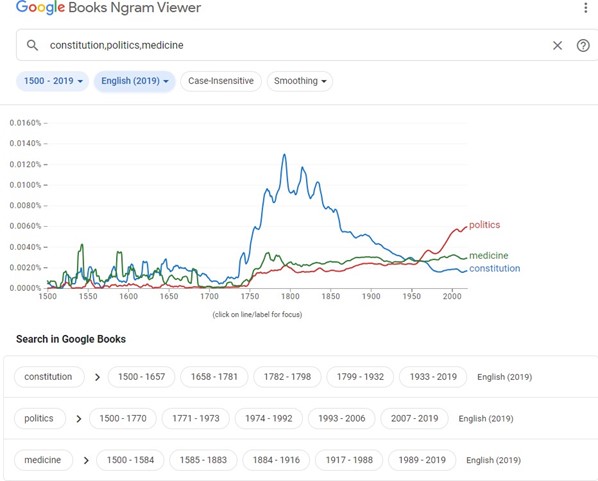This article was originally published in April 2020.
“It is always said that a man grows more conservative as he grows older; but for my part, I feel myself in many ways growing more and more revolutionary” – G.K. Chesterton.
One should never attempt to fight the enemy on his home turf. Unfortunately, conservatives have been doing exactly that for the past 60 years. The changes to the social fabric that have occurred over decades, courtesy of the left’s dominance on the cultural front, have been nothing short of extreme. Such changes are paramount to an intergenerational sociocultural revolution, one which many “conservatives” refuse to acknowledge the significance of, either due to ignorance, arrogance, or cowardice.
Some would rather indulge in the rather fashionable practice of vacuous contrarianism, insisting that the concept of “Culture War” is trivial; imported for the sake of disruption rather than anything important. I can assure you, it’s not. Despite the coronavirus pandemic, our politics continue to no longer be defined by the material and the necessities for survival. Nor is it defined by the intricate details of policy papers. Rather, it is fundamentally cultural; it is an existential conflict, one which has emerged amid the increasingly different ways we define who we are. Far too many conservatives underestimate the importance of this fact. Far too many conservatives just don’t get it.
Defining the Enemy
The most common understanding of the left is the left-wing party. Naturally, in Britain, the Labour Party comes to mind. It’s those socialist maniacs who want to raise your taxes, bankrupt the country, and bring back the IRA. To some extent or another, this may or not be true. Some may be (correctly) willing to push the boat out and incorporate other parties such as the Liberal Democrats and the SNP into this understanding. Whilst they incorporate different ideological strands into their party platforms (i.e. liberalism, Scottish nationalism, etc.) they are still understood as belonging to the broadly progressive, left-of-centre bloc of British politics. Of course, this excludes the Conservatives themselves, not because they’re right-wing, but because they are not ‘officially’ seen as such.
However, specifically in the scope of culture, “the left” has historically been encapsulated in (as one in the midst of China’s own cultural revolution would put it) the hatred of “old customs, old culture, old habits, and old ideas”. It is the movement which not only holds these things in contempt, but has artificial over the course of several generations, actively sought to undermine them, and supplant them with placeholders. Whether it is branded as liberation or social justice, deconstruction or decolonisation, the motive is the same: the eradication of Britain’s true understanding of itself. It is the removal of a nation’s identity, onto which another one can be projected; one that serves the interests of the revolutionaries, who have long since been assimilated into positions of officialdom. Tradition, in all its forms, is not a milestone of progress to these people, but something which stands in its way. Tradition are markers of oppression, bigotry, and other devalued soundbite terms that have long infested modern politico-cultural discourse.
This outlook, when put into perspective, is hardly contained within the confines of mainstream political parties. On the contrary, the most ardent advocates and enforcers of these ideas do not have a seat in parliament or hold a party membership card, yet they still wield extraordinary amounts of influence over the public realm, either as well-known figures or grey eminences. If conservatives are to get serious about conserving, they will have to think outside the party-political box and engage with the wider political arena; the Labour Party is merely one of many heads of the progressive hydra that has been wreaking havoc on our country.
The Conservative Problem: The World Moves On
So often, mainstream conservative figures evoke the Devil-like image of Marx, whose communist ideals linger within the minds of leftists. This is often done with the hope of incentivizing the public to steer clear of such people. This poses two problems. One is that most people (especially young people) really don’t care about the “threat of communism”. They may find the CCP distasteful, they may prefer the USA as the world hegemon, but people (again, especially young people) don’t have a potently adverse reaction to communism. Keep in mind, this general sense of apathy is also felt towards other historically charged political forces, such as the IRA, Hamas, and Venezuelan Socialism. Indeed, one could say the same thing about National Socialism, but I digress.
Too many conservatives fundamentally misunderstand of the type of left we are up against, not just in the party-political sphere but in all nooks and crannies of every institution of society. If you want to understand the grotesque and underhand nature of modern leftism, you’re better off the intellectual descendants of Marx, rather than Marx himself. Whilst Marx called for the proletariat to revolt against their bourgeoisie oppressors, Gramsci fixated on the issue of cultural hegemony – that economic transformations can only occur if a society is preconditioned with the necessary cultural values; it is these cultural values that justify whatever economic system is in place, and by extension, the specific nature of economic redistribution. Conservatives can hardly hope to win if they can’t even recognise the type of battle that’s being fought which is, first and foremost, one of a cultural nature.
Politics is Downstream from Culture
Supremacy in Parliament is important; it is the sovereign legislature after all. However, conservatives must remember that power, in all its forms, transcends the walls of Westminster; capturing the building where legislation is made must be combined with capturing the institutions that shape our nation’s political “Overton Window”. It is this framework that inspires the legislation that is created within it and dictates what legislation can exist. If legislation isn’t allowed to exist in a ‘culturally appropriate’ sense, then it almost certainly won’t be allowed to exist in a practical sense.
Conservatives must reaffirm themselves with the timeless truth that “politics is downstream from culture”. Politicians are important actors, but they are not the only actors. Conservatives must learn to march through the institutions as the left has done for so many years with frightening efficacy, whether it be in the classroom or the court room, the media or the civil service, the hospitals or the churches. It is victory on this front that has already altered the perceptions we have of our society, and therefore how we conduct our politics.
Currently, the products of these institutions are often laced and ingrained with progressive preconceptions and cultural attitudes. Dissenting views and sentiments are purged from the circles that produce these mass-consumed cultural products. This is not because they are wrong in any objective sense, on the contrary, many have realised that what’s said in these instances is actually pretty milquetoast (“trans women aren’t biological women, etc.). People’s politics are shaped by the environment in which they operate, and as time has gone by, the leftist-domination of seemingly neutral institutions has resulted in those who would otherwise being apolitical becoming (either explicitly or implicitly) averse or straight up hostile to conservatism. Then again, why shouldn’t cultural progressives do this? They have shown time and time again that they cannot (currently) advance their ideas via the ballot box, so instead they focus on maintaining and integrating their power where it already exists and doing what they can from there.
Conservatives are foolish if they think that they can ignore the concerns of people until they reach 30. Whilst young conservatives are more radical than their elders, they are fewer in number. Young people are far more hostile to conservatism than 40 years ago, and older people are becoming increasingly progressive themselves. The demography is against us, in more ways than one. They may not call for the workers of the world to unite, but they still hold disdain for those who hold socially traditionalist sentiments. The Conservative Party can win as many elections as it likes, but it won’t matter provided culturally conservative ideas are suppressed and forced to remain on the fringes. The electorate may not be averse to the Party, but as for the philosophy from which it draws its name, that a very different kettle of fish.
The Conservative Problem: Parliament is the Ultimate Prize
Despite all this, it is hard for many in the Conservative Party to comprehend how “the left” continues to be an existential threat to the British and our way of life. When I converse with Conservative Party members, many often exalt over “Bojo winning a stonking 80 seat majority and saving Britain from the clutches of Red Jezza”. Once again, the problem with this is that it reduces the political to party politics, electoral success, and the squabbles of Westminster and Tory Twitter. It also severely underestimates the vehicle for change an 80-seat majority could act as provided we addressed the current cultural paradigm in which the party is forced to operate. A cultural paradigm that will only continue in the favour of progressives provided conservatives get their act together.
Unfortunately, anytime someone within the ranks of the party dares to defend Britain from continuous desecration besides the safe stuff, such as the monarchy and purely liberal-democratic interpretations of Brexit, much like the spiteful and monotonous Marxist-drones thy insist to be so different from, they hound you, assassinate your character, declare you unfit for public life. To not sufficiently submit to the brand of “Conservatism” permitted by the current cultural paradigm is often nothing short of social suicide. This also goes for those who espouse their profusive love for the “broadchurch” and talk about free-thinking with impassioned vigour, like some firebrand philosopher from the enlightenment. Then again, one should expect such two-faced behaviour from careerist sycophants. For the overwhelming number of apparatchiks, patriotism is just for show.
This is not to say supporting the monarchy and Brexit are bad things. On the contrary, I am a monarchist (although, I am not a Windsorian) and favoured Brexit before Brexit was even a word. What should be noted though is that to truly prevent Britain’s abolition, we must do so much more. This “do what you like so long as it doesn’t affect my me or my wallet” mindset is deeply ingrained into our society, even in its economically downtrodden state, inhibits the political conscience we require for national renewal.
Of course, there have been “attempts” by “culturally conservative” minded individuals to engage in cultural discourse. Pity they rarely talk about anything cultural or conservative. Normally its either some astroturfed rhetoric about the wonders of free-market capitalism and individualism, and the menaces of socialism and big-government. When they do, it’s nothing more than them desperately trying to prove to their left-leaning counterparts that they’re “not like those other nasty Tories” or that it “it’s actually the Left that is guilty of [insert farcical modern sin here]”. I look forward to living in the increasingly cursed progressive singularity in which leftists and “rightists” are arguing over who’s more supportive of drag-queen story time, mass immigration, and open-relationship polyamory. What’s more, attempts to indoctrinate the youth into becoming neoliberal shills could be more forgivable if their attempts weren’t teeth-grindingly cringey.
The Mechanics of Political Discourse
The mainstream media, for example, is one of many institutions dominated by cultural progressives, has long perpetuated the façade of meaningful politico-cultural discourse. How many times have we seen a Brexiteer and a Remainer go head-to-head on talk shows and debate programs only for it to be a session of who can come across as the most liberal and globalist? “Brexit is a tragic isolationist, nationalist project” pathetically weeps the [feckless and unpatriotic] Remainer. “No no, it is THE EU that is the isolationist, nationalist project!” righteously proclaims the [spineless and annoying] Brexiteer. These people talk as if the British populace have all unanimously agreed that therapeutic-managerialism is currently the best thing for their country. As much as the grifters and gatekeepers might like to ride the “reject the establishment, stand up for Britain” wave to boost their online clout, they’re just as detached from the concerns and problems facing Britain as “those damn brussels bureaucrats” and “out-of-touch metropolitan lefties”. As a Brexiteer you’ll have to forgive my mind-crippling ignorance, but I am highly suspicious of the idea that most Leave voters sought to accelerate the effects of economic and cultural globalisation. Brexit, by all measures, drew the battle lines between the culturally conservative Leavers and the culturally liberal Remainers (individual exceptions accounted for).
This influence must not be taken lightly, even the most authoritarian regimes must rely on some consent and co-operation from forces beyond the central government. Not the people of course, but those who assist it in the government’s ability to govern; an all-encompassing apparatus through which a government may be permitted to assert its influence; comprised of NGOs, QUANGOs, the civil service, the mainsteam press, and various directly affected sections of society with vested interests in the form of corporate monopolies, universities, and devolved bodies. Without support and co-operation from these institutions, a government’s ability to exert influence is drastically limited. It is from these non-parliamentary sources of influence that have come to possess substantial (and practically unaccountable) amounts of power over the politico-cultural discourse. They decide what questions exist, what topics are taught, how issues are discussed, what viewpoints get publicity, what projects receive funding, what subjects’ officially matter… they decide what’s funny, and what’s not!
The cultural values at the top of society, and therefore endemic to society as a whole, lend themselves both to the creation of a cohesive ruling class. One with capabilities so indispensable to government that even if a party were to capture power on a conservative platform, it likely wouldn’t make all or most of the necessary changes needed. It also makes those values assume a special worth that other cultural attitudes do not have. Like all such “sacred” values, they do not exist in a single place, they permeate out as both a civilisation’s assumed-to-be natural moral standards and as something which exists at the top of socio-cultural hierarchy of status.
The Conservative Problem: The Rules are Fair
Considering what is a highly restrictive discourse, many will shake their fist and declare “you just can’t say anything these days”. Total rubbish. You just say certain things. You can say that mass-immigration is a blessing. You can say we should normalise dating sex workers. You can’t say anything meaningful about the nationwide grooming gangs or “I personally believe {insert any run of the mill socially conservative view here}. If you do, you’ll end get fired from your job, or the Church of England and be forced to issue a grovelling and humiliating press-mandated apology for harbouring remnants of Christian sentiment. The New Statesman-lead character assassination of the late and great Sir Roger Scruton, a smear campaign by the media that continued even after his death, is a rather poetic embodiment of the conservative situation. The great irony of liberalism is debating whether one should tolerate those with alternative attitudes (regardless of how illiberal) or utilise the power of institutions to force those people to adopt liberal ones, explicitly or implicitly. As one would expect, vast majority of liberals in recent years have selected the latter. Openness must be secured through the exclusion of those that demand exclusion, which neccesarily narrows the scope of politics.
Unfortunately, despite cultural leftists wanting to eradicate them for political life, conservatives still see themselves as above obtaining and using power. Again, they’ll try their hardest to win an election, but when it comes to actively supporting the defence and furtherance of conservative values they’d much rather not be involved. At most they’ll shake their heads at those crazy progressives with their wacky pronouns and move onto the next Twitter controversy. Of course, power is not the only thing of value in this world, but is neccesary asset if you want your principles to actually mean something. It is hardly a sufficient response to throw your hands up and declare yourself above the fight. If anything, it’s the acknowledgment of this reality that makes people conservatives in the first place.
On Counter-Revolution
A cultural counter-revolution is possible. However, it will require conservatives coming to terms with their new roles, not as protectors of the status quo, but as those who are reacting to the increasing perversity, corruption, and sclerosis of the new order. The struggle will be long but that it is the only way it can be. Efforts to conserve our future must begin in the present, even if we look to the glories of the past for inspiration.
Many will not stand as they do not have a conservative bone in their body and are in themselves part of the problem. Others will be defiant about taking a stand at all. They will self-righteously declare:
“I’m not choosing a side. I want nothing to do with this. It’s got nothing to do with me!”
Unfortunately for them, the choice to be apathetic about the destruction of your civilisation is still a choice. Many haven’t clocked that politics is not only a never-ending war, but an unavoidable one; one which we are losing, with consequences mounting with every generation.
Of course, a lot of conservative activists are like me. We are not just Conservatives in the sense of party membership, we are instinctually conservative. We came to the Conservative Party because, despite the self-interested careerists and the severe shortcomings in policy in recent years, we recognised that the party itself serves a fundamental role in making our voices heard. As much as liberals in the party would like to throw us out by the scruff of our necks, one can only deny social conservatives their rightful place within the Conservative Party for so long.
Although I must say, I was hoping that a party with an 80-seat majority would have more vitality than a freshly neutered dog. Far too many Conservatives would prefer the party to be an over-glorified David Cameron appreciation club, or the parliamentary wing of the Adam Smith Institute, rather than the natural party of Britain. A Conservative Party that supports conservatism will not alone be enough, but it will be necessary, The Conservative – Labour/Liberal dichotomy is so ingrained in British politics that an alternative right-wing is likely to fall flat, even when there may be demand for one.
I am sure we are not small men on the wrong side of history. However, should I be wrong, I have the benefit of being young and naïve. I have come to terms with being an argumentative, nationalistic Zoomer and I’m far too stubborn to give up on my ideals, especially at this stage in my life. The fire of counter-revolution must not be extinguished, it must be passed down.
My fellow rightists, you can continue leading the life of a cringe, narrow-minded normiecon; begrudgingly submitting to apparatchiks, gatekeepers, and controlled opposition; parroting every stale, uninspiring, mass-produced talking point to inoculate against the turbulence of politics. Alternatively, you can break your chains and take Britain’s destiny into your hands.




